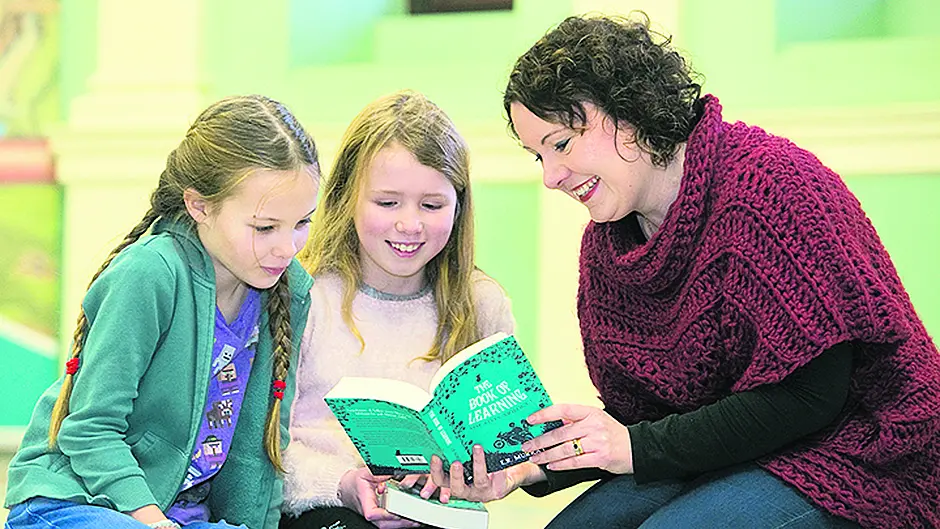Schull writer ER Murray says the names and places of West Cork influenced elements of the characters and stories in her Nines Lives trilogy, which comes to an end with her latest book
Schull writer ER Murray says the names and places of West Cork influenced elements of the characters and stories in her Nines Lives trilogy, which comes to an end with her latest book
By Peter Allen
SCHULL-based author ER Murray has just published the third and final book in her Young Adult fantasy Nine Lives trilogy, The Book of Revenge.
Nine Lives has a dual setting – Dublin and West Cork – two locations very familiar to the writer, having left a ‘well-paid job’ in Dublin to come south to concentrate on her writing.
Immersion in local life was essential for each book. ‘I wanted somewhere that would enable me to focus, as well as somewhere I could afford to live – the life I had in Dublin at that time could not be maintained once I reduced my income,’ she notes.
The move to West Cork gave her the time to finish her manuscript, and eventually she had a book deal with a publisher.
‘I created a fictional village, Oddley Cove, based on my favourite elements of different villages in the area, and I fused in real places such as Gun Point and Roaring Water Bay,’ she explains.
Indeed, the characters in her fiction books generally make use of elements in the real-life localities which inspired her. ‘Cedric, the submarine shark, is based on a real basking shark that peeked into our boat when we were fishing once, and the name Cornelius was inspired by a local man,’ she explains. ER says a boat disaster in one of the books was loosely based on an experience she had while travelling back from Cape Clear, although it was heavily embellished for the fictional account, of course.
She says her love of reading and writing comes from a deep connection with words. ‘Writing feels like a natural part of everyday life for me, like walking and breathing. When I don’t get to write, it feels like something essential has been neglected – I really miss it.’
The fantasy writer’s process can be complex. Fantasy worlds and stories must be believable but also have colour, truth, life, breath, conflict and resolution. If these elements are missing, the stories can come across as contrived or lacking. ‘I use everyday life experiences in all aspects of my writing, whether from memory or day-to-day experiences.’
Unusually, ER doesn’t have a great eye for detail, which many people find amusing when they discover she is a writer. However, emotional resonance is what matters most to her in a story. The minutiae can be filled in later. ‘When I’m drawing on my experiences, I look to strong emotions, memories and events that run deep. I do touch on dark topics in my children’s stories – death, loss, fear – but I always keep an element of hope and so the feelings I draw on are often positive ones.’ She also hopes that when reading her books, children will lose themselves in an adventure, but come away with a sense of possibility.
Having been a child of Margaret Thatcher’s 1980s, and experienced the class dynamics of that time in Britain, the author is well aware how difficult it can be for some writers to break into the industry. ‘You would hope that with the invention of internet and improved access to the world in terms of education, there would be more opportunities for people from working class and impoverished backgrounds to become writers – but it is difficult to create when you’re living without stability. And the reality is that people have many worries to contend with, on a constant basis.’
ER Murray knows that some people infuse the elements of their difficult lives into their work, but class and wealth are both still barriers. ‘I work freelance and travel for events in schools, libraries and festivals to make a living, but it means lots of time away from home and long working hours.’
She thinks that literature festivals are a great way for writers to network, without incurring too much expense. ‘Festivals have lots of free events to include as many people in the writing world as possible,’ she points out, adding that social media and the internet means that writers are no longer unreachable beings. ‘It is certainly easier to hear about publishing opportunities and meet authors and industry professionals, because of the internet.’
The author is enthusiastic about her appreciation of her own favorite fantasy author, Neil Gaiman. ‘Everything he writes is magic. The way he talks about writing and creativity is magic. His book, American Gods, is the one book I wish I had written.’
The wrapping-up of a fantasy series can prove difficult for many authors who build multi-book length stories full of characters and complex plotlines. ER Murray is no different.
‘The final part of the trilogy, The Book of Revenge, is the fourth book I’ve written, and the most difficult so far. Partly because I was burnt out after publishing three books in 12 months, and because it was so specific. It had to tie up all loose ends from books one and two, be an interesting story, continue the tone, but be fresh and new.’
She hopes that regular readers will enjoy her new book which continues the adventures of Ebony Smart, and that it might attract a few new fans, too. ‘I am very proud of it – I think I did a good job and can’t wait for people to read it. This book is the biggest challenge yet for Ebony Smart, with more than ever at stake. I don’t want to give too much away, but you might need a box of tissues to hand!’
The Book of Revenge, published by Mercier Press, is now available.









